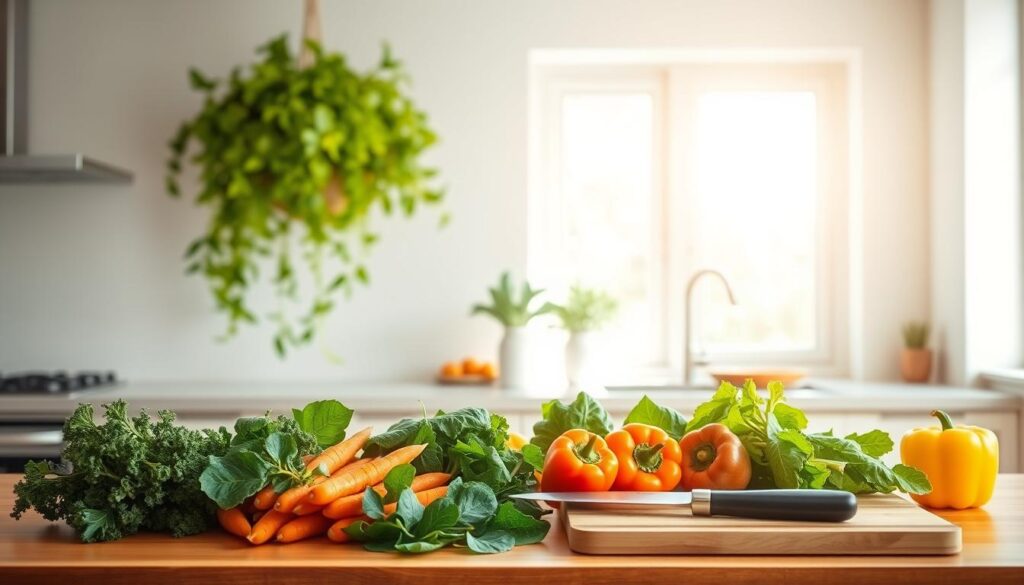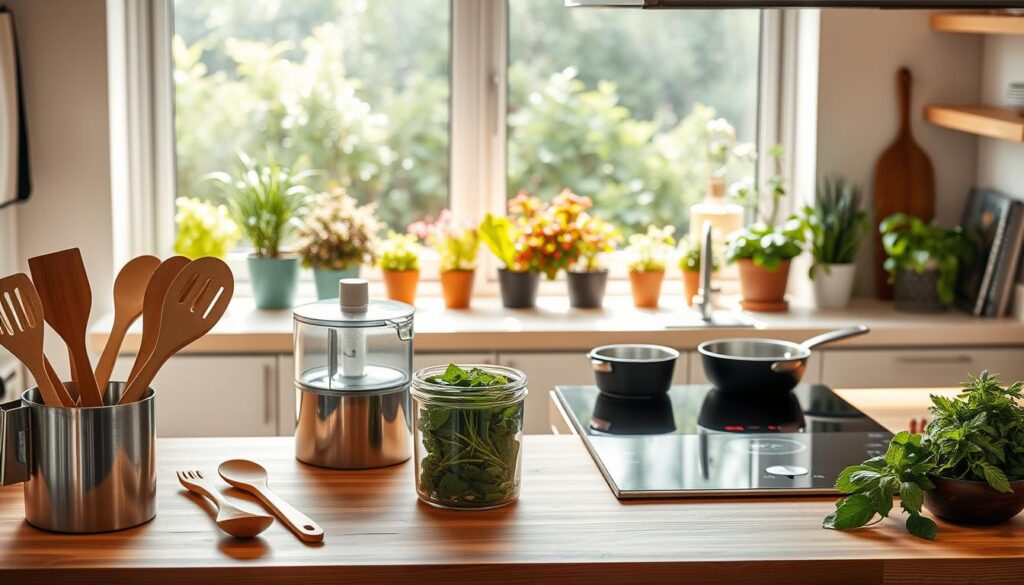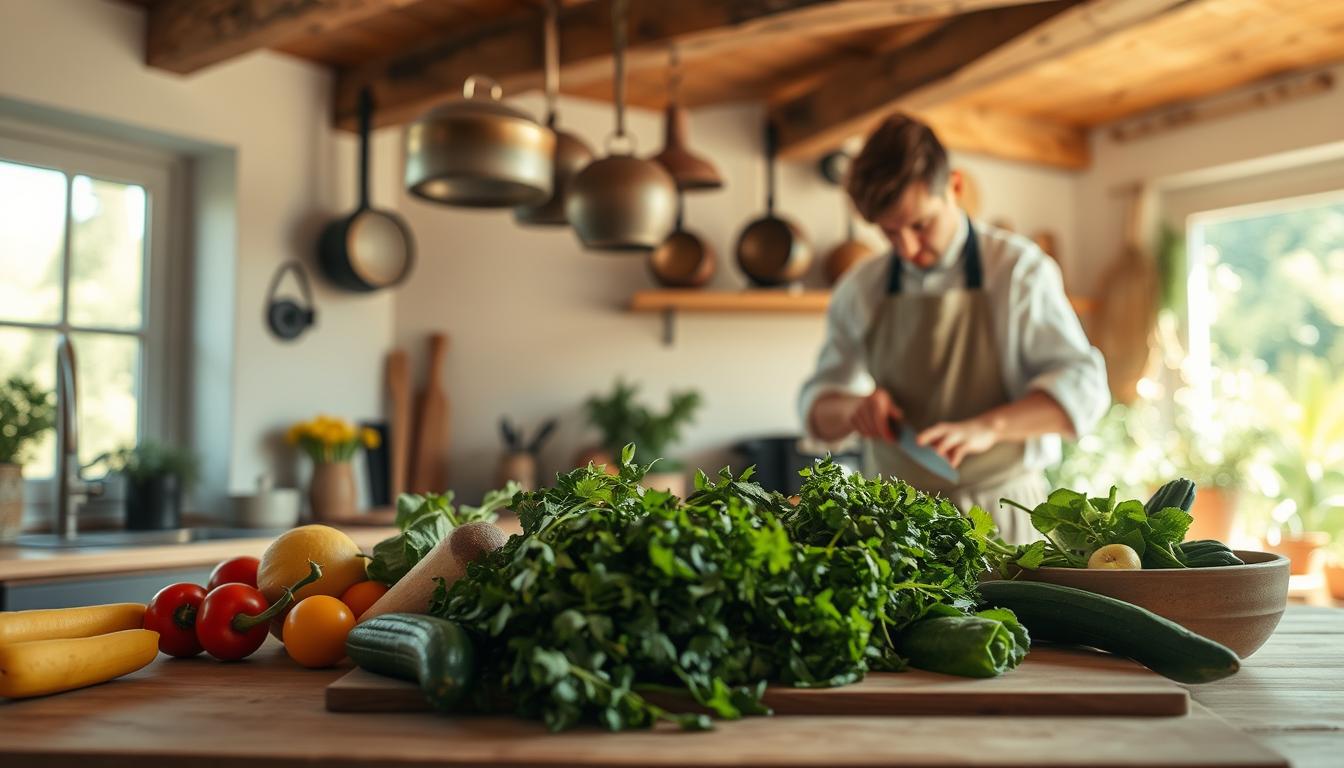We’re learning how important sustainable cooking is for our planet and health. Simple changes in our daily habits can make a big difference. By cooking sustainably, we can help the environment and our health.
Studies show that not using trays can cut down food waste by 40%. This shows how big of a deal sustainable cooking is. By choosing eco-friendly meals, we can lessen our impact on the planet.
Exploring sustainable cooking, we’ll see how eco-friendly meals help. We’ll talk about eating less meat and using energy-saving appliances. Making smart choices in our cooking can lead to a greener future.
Key Takeaways
- Adopting sustainable cooking practices can reduce our carbon footprint and contribute to a healthier planet.
- Eco-friendly recipes and dinner ideas can help reduce food waste and create a more sustainable food system.
- Reducing meat consumption and using energy-efficient appliances are simple ways to make a positive impact on the environment.
- Sustainable cooking practices can also have a positive impact on human health, by providing nutritious and wholesome meals.
- By making conscious choices in our daily lives, we can contribute to a more sustainable future and a healthier planet.
Understanding Sustainable Cooking Practices
Exploring sustainable cooking is key to our daily lives. A green kitchen is vital for reducing our carbon footprint and supporting the environment. By choosing sustainable dinner recipes, we can greatly reduce food waste and save energy.
Important principles of sustainable cooking include cutting down energy waste, using local ingredients, and reducing food waste. These actions help us lower our carbon footprint and support a greener future. For instance, picking local ingredients can reduce food transport emissions by up to 10 times.
Here are some benefits of sustainable cooking practices:
- Reduces food waste, which contributes to approximately 25% of global greenhouse gas emissions
- Cuts down the carbon footprint of food transportation by up to 10 times
- Conserves energy and water in the kitchen
By adopting sustainable cooking, we can make our kitchens more eco-friendly. This supports a healthier environment. Every small action, like saving energy or using sustainable recipes, helps our planet.
| Practice | Benefit |
|---|---|
| Reducing energy waste | Conserves energy and reduces carbon footprint |
| Using locally sourced ingredients | Cuts down the carbon footprint of food transportation |
| Minimizing food waste | Reduces greenhouse gas emissions and conserves resources |
Sourcing Local Ingredients for Our Meals
Choosing local ingredients is key for eco-friendly cooking. It boosts the local economy and cuts down on carbon emissions from food transport. In fact, using local ingredients can cut carbon emissions by up to 25% compared to food from far away.
Local ingredients also help us follow green kitchen tips. They help reduce food waste and save energy. About 70% of people think buying local helps their local economy. Plus, local produce is often 30% more nutritious than imported food.
To find local farmers’ markets, just search online or ask your local government. Knowing what’s in season helps us use the freshest ingredients. By using local ingredients, we support our community and help sustainable farming.
Some benefits of using local ingredients include:
- Reduced carbon emissions
- Support for the local economy
- Fresher, more nutritious produce
- Increased biodiversity
By following these tips and choosing local ingredients, we help our environment and community. We also get to enjoy tasty and healthy meals.
The Role of Plant-Based Ingredients
Exploring sustainable cooking, we find plant-based ingredients key to reducing our environmental impact. They are becoming more popular for eco-friendly meals. A recent survey shows 66% of people worldwide are ready to spend more on sustainable products.
Plant-based foods help cut down on greenhouse gases and save water. For example, making one pound of plant-based protein uses less energy, water, and land than beef. Choosing these options can greatly reduce our carbon footprint and help the planet.
Plant-based ingredients bring many benefits, including:
- Reduced greenhouse gas emissions
- Water conservation
- Land preservation
- Lower energy consumption
To make our dinners more sustainable, we should use more plant-based ingredients. The plant-based meat market is growing fast, expected to hit over $13 billion by 2027. Making smart food choices helps us and the planet.

By using plant-based ingredients and sustainable cooking, we can improve our future. With a bit of creativity, we can make tasty, eco-friendly meals that are good for us and the planet.
| Plant-Based Ingredient | Environmental Benefit |
|---|---|
| Legumes | High protein content, low water usage |
| Whole grains | Low energy consumption, reduced greenhouse gas emissions |
| Nuts and seeds | Rich in healthy fats, low land usage |
Reducing Food Waste in Our Kitchens
Creating an eco-friendly kitchen means cutting down on food waste. In the U.S., 30-40% of food is wasted at home. We can fight this by planning meals better, using leftovers creatively, and composting.
In our green kitchen, we can make a big difference. For example, cooling leftovers before refrigerating them helps. Using reusable containers also cuts down on waste. Plus, we can find new ways to use ingredients that might get thrown away.
- Planning meals in advance to avoid buying too much food
- Using up leftovers in creative ways, such as turning last night’s dinner into tomorrow’s lunch
- Composting food scraps to create nutrient-rich soil for our gardens
By making these habits part of our daily life, we can greatly reduce kitchen waste. This makes our cooking more sustainable.
Energy-Efficient Cooking Techniques
Exploring sustainable dinner recipes and eco-friendly cooking is key. We must talk about energy-efficient cooking methods. These techniques help us use less energy and make our kitchens greener. Using ENERGY STAR appliances is a great start. They use up to 50% less energy and water than regular ones.
Simple ways to save energy include using lids on pots and pans. This cuts down cooking time and energy use. For small meals, use smaller appliances to avoid wasting energy. Steaming vegetables also saves water, helping with conservation.
Other smart cooking methods include using pressure cookers and induction cooktops. Pressure cookers can cut cooking time by 70%. Induction cooktops are 84% energy efficient. By using these and eco-friendly products, we can make our kitchens more sustainable and use less energy.
Remember, every small change helps. By working together, we can make a big difference in promoting eco-friendly cooking.
Here are some key energy-saving cooking tips:
- Use lids on pots and pans to save time and energy.
- Choose smaller appliances for small meals to avoid waste.
- Steam vegetables to save water and energy.
- Use pressure cookers to cook faster and use less energy.
- Opt for induction cooktops for their high energy efficiency.
Eco-Friendly Kitchen Tools and Equipment
Adopting green kitchen tips and sustainable cooking is key. We should think about the tools and equipment we use. Choosing sustainable cookware like stainless steel or cast iron helps a lot. Also, using durable utensils made from bamboo or recycled metals cuts down on waste.
Here are some eco-friendly kitchen tools and equipment to consider:
- Reusable straws and containers to reduce single-use plastic waste
- Beeswax wraps or cloth wraps to replace plastic wrap
- Stainless steel or cast iron cookware to reduce non-stick coating waste
- Bamboo or wooden utensils to replace plastic utensils
By using these green kitchen tips, we can lessen our environmental impact. For instance, switching to stainless steel containers avoids BPA exposure. Composting food scraps also cuts down on greenhouse gas emissions.

Creating a sustainable kitchen means choosing the right materials and products. Eco-friendly kitchen tools and equipment help us cook sustainably and reduce our environmental footprint.
| Material | Benefits |
|---|---|
| Stainless Steel | Durable, non-toxic, and recyclable |
| Bamboo | Sustainable, renewable, and biodegradable |
| Cast Iron | Durable, non-toxic, and can be recycled |
The Impact of Sustainable Cooking on Our Health
Exploring the benefits of sustainable cooking shows its positive impact on our health. By using eco-friendly recipes, we boost our nutrition and mental well-being. Sustainable cooking can cut carbon emissions by up to 30% with energy-efficient appliances.
Some key benefits include:
- Reduced carbon footprint
- Increased nutritional value of meals
- Improved mental wellness through cooking
Adopting sustainable cooking helps reduce food waste and supports balanced diets. Using local, seasonal ingredients cuts carbon emissions by about 40% compared to imported goods. Seasonal foods are also 20% cheaper on average than out-of-season ones.
As we dive deeper into sustainable cooking, its health benefits are clear. Adding eco-friendly recipes to our daily meals promotes a healthier, more sustainable lifestyle.
Educating Ourselves and Others
Starting our journey to adopt sustainable cooking is key. We must teach ourselves and others about its value. By doing so, we build a community that supports green kitchen ways.
Here are some ways to spread the word:
- Go to workshops and community events about sustainable cooking.
- Post recipes and tips on social media to encourage green kitchen habits.
- Join local food movements and support farmers’ markets.
Together, we can make a big difference. Every small step we take helps. Our combined efforts can lead to big changes.
Studies show that our food choices matter a lot. Eating plant-based and recycling food waste can cut down greenhouse gas emissions. By making smart choices and teaching others, we help create a better future.
| Country | Recycling Rate |
|---|---|
| Taiwan | 50% |
| Indonesia | 12% |
By choosing sustainable cooking and green kitchen habits, we help the planet. We also ensure a healthier, more sustainable world for all.
Embracing a Lifestyle of Sustainability
As we wrap up our look at sustainable cooking, it’s clear that living an
eco-friendly cooking
and
green kitchen tips
lifestyle is key. It helps us build a healthier, greener future. By starting a sustainable cooking routine and joining local food efforts, we can all help our planet.
Building a Sustainable Cooking Routine
Adding sustainable cooking habits to our daily lives is a big step. It means planning meals, cutting down on waste, and using energy-saving cooking ways. With a bit of thought and creativity, our kitchens can become green spaces.
Engaging with Local Food Movements
Getting involved with local food makers, farmers’ markets, and gardens helps us understand sustainable food better. Supporting these groups means we get fresh, healthy food and help cut down on carbon emissions from long-distance food transport.
Our Collective Responsibility Towards the Planet
Choosing a sustainable kitchen lifestyle is part of our duty to protect Earth. Our actions can inspire others to live greener. Together, we can make sustainable cooking the standard, improving our health and the planet’s.

